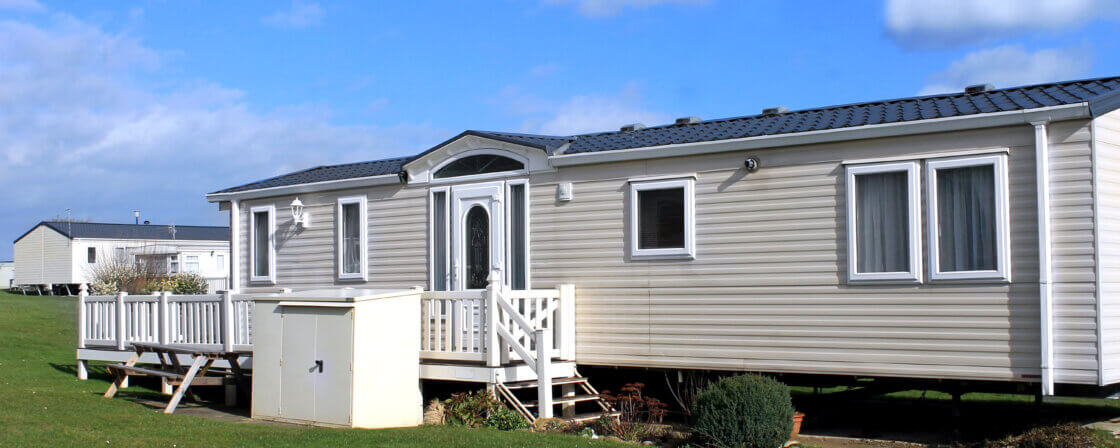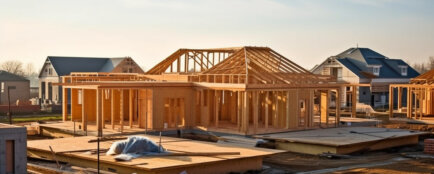What is a mobile home
A mobile home, also known as a mobilheim, is a structure built in a factory and then transported to a specific location for use as a permanent or temporary residence. These houses are usually constructed on a chassis with wheels, which allows them to be moved. However, many people leave their mobile homes in one place permanently or long-term as an alternative to a traditional brick house or wooden house.
Mobile homes come in a variety of sizes and configurations. Their floor area is typically between 20 and 60 m2 and the most common layout is a 3 bedroom, 3 bathroom layout, i.e. a kitchenette combined with living areas, two bedrooms and one bathroom. Due to their design and mobility , they are generally cheaper than traditional houses, making them a popular choice for affordable housing in our country.
Tip for article
Mobile homes are not the only alternative to traditional housing. Read our article on container homes.
Vacation vs. year-round mobile home
The difference between a holiday home and a year-round mobile home lies primarily in their construction, insulation and equipment:
- Construction and insulation
- Recreational mobile homes: These are typically designed for use during the warmer months or in milder climates. They have weaker insulation and are not designed for long-term living in colder conditions. Less insulation means they are not very effective at keeping you warm during the winter and cool during the summer.
- Year-round mobilheims: These are designed to be livable year-round, regardless of weather conditions. They have better insulation and are more resistant to extreme temperatures. This improved insulation helps keep the temperature inside the mobilheim stable, which is essential for comfortable living during the winter months.
- Features and comfort
- Holiday mobile homes: They only have basic amenities because they are only intended for temporary accommodation such as holidays or weekend trips. Thus, they may not provide the comforts you would expect from a permanent home.
- Year-round mobile homes: They usually come with better amenities, including higher quality heating systems and better kitchen and bathroom facilities. These mobilehomes are designed to provide greater comfort and functionality for long-term living.
- Price and maintenance
- Vacation mobile homes: they are usually more affordable, but will require more maintenance if used in colder conditions. If you get a recreational mobile home that you plan to live in year-round, modifications will need to be made, especially in terms of insulation.
- Year-round mobile homes tend to be more expensive due to better insulation and higher quality construction, but can be more economical in the long run due to lower heating costs and better weather resistance.
Are you solving a similar problem?
Are you planning to buy a property?
We will provide you with a complete contractual and legal service related to the purchase or sale of real estate. We can do it within 48 hours, flawlessly and professionally.
I want legal service
- When you order, you know what you will get and how much it will cost.
- We handle everything online or in person at one of our 6 offices.
- We handle 8 out of 10 requests within 2 working days.
- We have specialists for every field of law.
Buying a mobile home
Many companies nowadays sell new, custom-made mobile homes. But many of them also sell used or refurbished mobile homes. Although used mobile homes are cheaper, they are most often imported from the West and are therefore adapted to a different climate than ours. For this reason, they need even more costly modifications. In addition, these houses may also contain hidden defects.
The most common hidden defects in mobile homes
When buying a used mobile home, it is important to check to see if you are buying a mold with the mobile home, for example. These are the most common defects that can occur with mobile homes:
- The condition of the chassis and frame: The chassis is the foundation of a mobile home. Look for signs of corrosion or unnatural bending. A corroded chassis can compromise the structural integrity of the home and make it unsafe. Subsequent repairs are costly and can make a used mobile home very expensive.
- Exterior condition: check the exterior walls for dents, cracks or holes. Also check the roof for leaks or damage.
- Check the interior: look for signs of water damage such as stains, mould or musty smells, especially around windows, doors and ceilings. Check the floor for soft spots that could indicate rot.
- Plumbing and electrical systems: make sure all plumbing fixtures are working and there are no leaks. Test the electrical system, including outlets and light fixtures, to make sure they are safe and functional.
- Heating and cooling systems: check the condition of the heating system.
- Windows and doors: Make sure they open and close properly. This is because damaged windows or doors greatly affect the overall insulation of the house.
- Appliances and accessories: Check that all attached appliances and accessories are in working order.
- Tires and mobility: If you plan to move the mobile home, check the tires and the mechanism used to pull it.
How to claim a mobile home
Despite the most thorough inspection, it is not possible to discover hidden defects. Fortunately, this doesn’t mean you have to accept the condition. Czech law provides for this possibility and therefore offers buyers protection. In a situation where you are buying a mobile home and it is not firmly attached to a foundation, Czech legislation views mobile homes as leisure vehicles.
If you buy a used mobile home from a private individual, you automatically get a warranty period of 6 months from the date of delivery of the mobile home to your specified location. If directly from a mobile home dealer, then the warranty period is 24 months. For the first 12 months, the burden of proof lies with the seller, who must prove that the mobile home was not defective at the time of sale. For the next 12 months, the burden of proof lies with the buyer.
Tip for article
Has someone sold you a mobile home that has defects you didn’t know about or doesn’t have the required features? We will assess your case and within 24 hours we will draft a proposal for legal services leading to a remedy.
You can use this guarantee for the hidden defects mentioned above. These are defects that the seller has not admitted to you and that cannot be detected during the inspection of the mobilheim. However, you must not repair the defect when making a claim, because if you do, you will no longer be entitled to a claim.
Land for mobilheim
It is not possible to build a mobile home anywhere. Mobile homes are considered to be a product that serves the function of a building if they are used as a dwelling, and therefore they can only be placed on a plot of land where they can be built. Therefore, before buying a plot for a mobile home, it will be necessary to consult the zoning plan.
The access road is also an important feature of a mobile home plot. This is because it must be spacious enough for the mobile home to be transported to its destination. It is also ideal to choose a flat site, otherwise landscaping will be required.
Conditions for the location of the mobile home
As already mentioned, a mobile home can only be sited on a plot where the building is permitted by the zoning plan. With the new Building Act came a new division of types of buildings. Thus, a mobilehome can now correspond to a small building or a simple building.
It can be a small building if you do not plan to live permanently in the mobilehome, you will place it on a building plot where there is already a house for living or recreation and it must also fit within the dimensions of a built-up area of 40 square metres and a height of up to 5 metres.
A simple building may then be a mobile home if you plan to live permanently in the mobile home. In this case, you need permission from the building authority and the building supervisor. However, you do not need to get it approved.
Tip for article
Fortunately, you don’t have to be apermanent resident, but you can get one from your parents or the local authority. There are also companies that will provide you with a virtual permanent residence including a mailbox. Prices range from a few tens to hundreds of crowns per month.
Mobile home mortgage
You can geta mortgage for a mobile home. However, you need to meet certain conditions, which vary from bank to bank. First and foremost, you usually need to ensure that the mobile home is not already mobile – that is, it must not have wheels and must therefore be settled on stilts. Most banks also insist that the mobile home must be firmly attached to the land and therefore have a description number and a registration number.
Mobile home rental
You can also rent a mobile home, both short-term, for example for a summer holiday by the water, and long-term, just like a traditional apartment or house. Especially in the latter case, there are a few things to keep in mind. These include the content of the rental agreement and the handover protocol, the refundable security deposit and its amount, and the conditions for the eventual termination of the rental agreement. We have already discussed all the necessary requirements in our earlier article on What to look out for when renting an apartment from the tenant’s point of view.
Summary
Mobile homes can be used for year-round living or recreation. Year-round mobile homes are more expensive, but offer lower heating costs and greater weather resistance due to better insulation and quality construction. New mobile homes are usually adapted to local conditions, while refurbished homes, often imported from abroad, may require costly modifications and may contain hidden defects such as underframe corrosion, roof damage or plumbing problems.
Czech laws protect buyers from hidden defects. A 24-month warranty applies when purchased from a dealer, and a 6-month warranty applies when purchased from a private party. However, a claim must be made before any repairs can be made. A mobile home can only be placed on a plot of land where the zoning plan allows it, and consideration must be given to the access road and terrain. For recreational use a mobile home is considered a small building, for permanent living it is considered a simple building, which requires planning permission.




